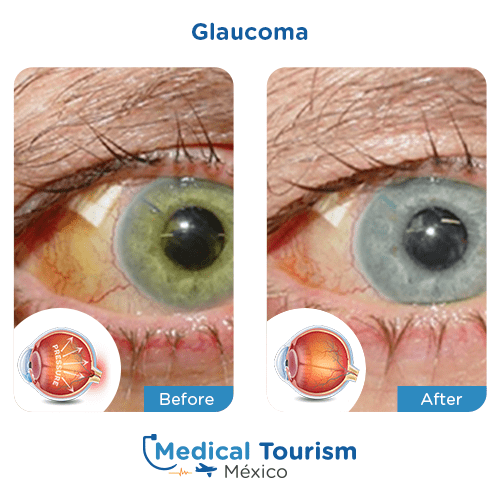The most reliable doctors in Mexico
Glaucoma surgery information and locations in Mexico
A glaucoma surgery seeks to reduce the increased pressure inside the eye. Surgeons employ many
different techniques depending on the patient. This procedure can be a same day procedure.
Depending on the area where the pressure originates, surgeons choose which procedure to employ.
In all procedures, the doctor places numbing drops on the patient’s eye, along with a sedative.
•Trabeculectomy: This is the most common procedure. The surgeon makes a small cut on the white of the eyes to drain excess fluid.
•Argon laser trabeculoplasty (ALT): A laser treats half of the clog at a time, so it drains gradually
•Selective laser trabeculoplasty (SLT): A low-level laser is targeted only to the parts where the pressure is located.
•Laser peripheral iridotomy (LPI): This is used if glaucoma originates between the iris and cornea.
•Trabeculectomy: This is the most common procedure. The surgeon makes a small cut on the white of the eyes to drain excess fluid.
•Argon laser trabeculoplasty (ALT): A laser treats half of the clog at a time, so it drains gradually
•Selective laser trabeculoplasty (SLT): A low-level laser is targeted only to the parts where the pressure is located.
•Laser peripheral iridotomy (LPI): This is used if glaucoma originates between the iris and cornea.
Schedule with a trusted specialist for glaucoma surgery in Mexico and start planning your trip!
Benefits
High success rates
Restores lost vision
Multiple options for treatment
Fast recovery times
Restores lost vision
Multiple options for treatment
Fast recovery times
Glaucoma surgery
Procedure:
15 min. - 1 hr.
Hospital stay: 1 - 2 hrs.
Cleared to fly: 1 - 7 days
Hospital stay: 1 - 2 hrs.
Cleared to fly: 1 - 7 days
After surgery
Out of town patients’ follow-ups are scheduled with the ophthalmologist after 1- 7 days from glaucoma surgery.
Patients are clear for flying after 1 - 7 days from glaucoma surgery.
Note: Follow-ups can be arranged as face-to-face or virtually. If needed, you can go to your primary care physician to remove sutures or get medication adjustments.
As an Amazon Associate, we earn from qualifying purchases.
Take a look at one of our medical tourism essentials for eye surgery.
Take a look at one of our medical tourism essentials for eye surgery.
Before and after images
View additional images for this procedure.

View more


Locations
Select the city of your choice to seethe doctors profile.
Ciudad Juarez, Chih.
Dr. Luis R. Juárez
View more

Glaucoma surgery frequent questions
Get answers to our most frequently asked questions and what to expect after the surgery.
Am I a candidate for glaucoma surgery?
Candidates for surgery are patients who have experienced severe glaucoma on one or both eyes, whom other forms of non-surgical treatment have proven ineffective. We recommend you to refer to one of our professional doctors for an evaluation to determine if you are a candidate for surgery.
Which procedure do I need?
Depending on where the pressure produced by glaucoma is affecting your eye will determinate what kind of procedure you need. Some procedures might be done after other forms of surgery have been ineffective. We recommend you to refer to one of our professional doctors to better understand what are your needs.
How can I prepare for surgery?
The doctor will usually ask you to continue any other form of treatment up until the morning of the surgery and will evaluate your eye to determine were the points of pressure originate.
Will I feel pain during surgery?
Your doctor will place drops on your eyes to numb them, during surgery will only feel some pressure on the eye. Some patients may ask the surgeon to use general anesthesia. We recommend you to refer to one of our professional doctors to see what is better for your body.
What happens after surgery?
Immediately after the procedure, you could experience some itch witch a burning sensation, and your eyes will be watery. At first, your vision will be blurry for the first weeks after surgery, and you will gradually start seeing more clearly.
Recent news
Disclaimer: This information does not reflect the medical advice from our clinics. All cases are different and this treatment may not suit you. Always refer to a medical professional with the certification and experience. All of our physicians are fully qualified to perform these procedures. For more information and diagnosis contact one of our top specialized clinics.
In all medical procedures, there are chances of complications, the specialist will provide you detailed information about the risks of the procedure, talk to the specialist directly.
In all medical procedures, there are chances of complications, the specialist will provide you detailed information about the risks of the procedure, talk to the specialist directly.





